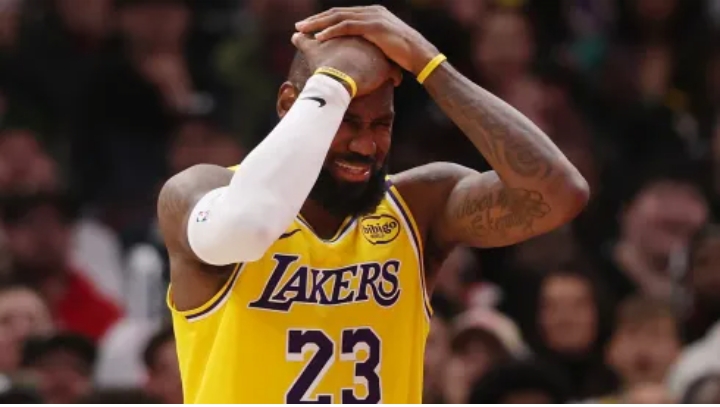JJ Redick was disappointed.
“Too many turnovers, too many offensive rebounds,” Redick said.
Luka Doncic was frustrated.
“I didn’t play the way I should,” Doncic said. “As a team, we didn’t play the way we could.”
Austin Reaves told reporters to put the blame for the Lakers’ disappointing first-round exit on him.
“I wasn’t good enough to help us be successful,” Reaves said. “I wish I could have done more.”
The Los Angeles Lakers were bounced from the playoffs on Wednesday, eliminated by the Minnesota Timberwolves in a 103–96 Game 5 defeat. They were pummeled on the glass (54–37) while getting outscored 56–40 in points in the paint. Rudy Gobert (27 points, 24 rebounds) was dominant. Julius Randle (11 points in the fourth quarter) was a closer down the stretch. Production from L.A.’s bench (four points) was nonexistent.
“Give Minnesota a lot of credit,” Redick said. “They’re a really good basketball team. I think our guys played hard enough and did all the right things. We tried to make it work with what we had and we came up a little short.”
Did we overrate the Lakers? Seems so. Expectations were high entering the postseason. L.A. won 50 games, good enough for the third seed in the Western Conference. The Lakers closed the regular season winning seven of the last 11, which included a season-ending loss to the Portland Trail Blazers the Lakers punted on. They beat the Oklahoma City Thunder, Memphis Grizzlies and Houston Rockets, twice. When the series against Minnesota was locked in, seemingly everyone, including ESPN’s army of NBA analysts, picked Los Angeles to win it.
“It sucks,” Rui Hachimura said. “We definitely didn’t expect to be eliminated in [the first round]. It’s kind of sad.”
Put simply: The Lakers were exposed. The post-Doncic trade surge was stunning. A locked in defense. An offense that clicked surprisingly quickly. There was a belief by many—this writer included—that the presence of two of the NBA’s best playoff performers would be enough for L.A. to make a deep playoff run.
Only it wasn’t. The three-point shot failed the Lakers. The lack of size killed them. Bench production deserted them. Reaves, who emerged as a potential third star in the second half of the season, didn’t play like one in the playoffs. Against a deep and experienced team in Minnesota, the Lakers were outplayed.
“We obviously put ourselves in a position to be in the game three times in the fourth quarter,” Redick said, “and just came up short every time.”
The offseason begins early in Los Angeles. And it’s a big one. The optimistic viewpoint is that this season was fool’s gold. The Lakers didn’t make the Doncic trade to win a championship this year—they said as much. Doncic, 26, was acquired to be the foundation of L.A.’s future, with the hope that he could squeeze out a title while LeBron James was still in uniform. Scratching out 50 wins was the basketball version of lightning in a bottle.
Next season, things will be different. James will be back. James was noncommittal on his long-term future on Wednesday, but he has given no indication that he is thinking about retirement. At 40, James remains near the top of his game. He averaged nearly 25 points per game this season and is a lock to land an All-NBA spot. He appeared to genuinely enjoy playing alongside Doncic and really liked playing with his son, Bronny, who is locked in on a multiyear contract.
Said James, “To be able to play the game that I love and to be able to be along my son this whole year has been one of the most gratifying, satisfying journeys I’ve ever been on.”
But James needs help. The frontcourt is the priority. Jaxson Hayes was unplayable this postseason, forcing the Lakers to play small against a big Minnesota team. Doncic thrives alongside mobile, springy centers (Dereck Lively II, Daniel Gafford) and the Lakers need to find one. They thought they had one in Mark Williams. That trade with Charlotte was rescinded over health concerns. They need to pick up another.
Depth is a need, too. Minnesota’s bench outscored the Lakers by more than 16 points per game in this series. Dalton Knecht played mop-up minutes. Gabe Vincent, a reliable reserve in the regular season, went scoreless in the last two games of the playoffs. As useful as Jarred Vanderbilt is defensively, his offensive limitations keep him off the floor. In Game 4, Redick didn’t make a single substitution in the second half.
Then there’s Doncic. Doncic continues to be an otherworldly scorer. But his defense is a problem. Too often, Doncic looks disengaged on that end. He routinely gets beat off the dribble. When the ball moves, he has a habit of giving up. The Lakers don’t regret the deal—I saw some of that in the water supply this week—but it is something that needs to be addressed. Doncic will never be an elite defender but he has the size to be a serviceable one. And he needs to be.
The Lakers shouldn’t look at this season as a failure. They acquired a transcendent superstar and seem to have the right coach to lead them. That’s something. They were not as good as a typical third seed and were beaten by a six-seed that was a lot better. But the work starts now. There will be urgency next season, when James will be 41 and Doncic, hopefully, will be in better shape.
“There’s obviously a lot of different things we can do, I can do,” Doncic said. “Obviously, everybody has got to get better. We’re going to have a long summer. We should focus on what we need [to do] to improve.”
Indeed. Success next season depends on it.

